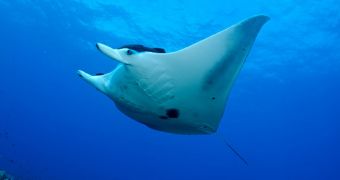Those who like wildlife documentaries featuring sharks and rays might want to take the time to binge watch as many as them as possible before some of the cast permanently and unwillingly retires.
Not to beat about the bush, a recent report made public by scientists working with the International Union for the Conservation of Nature says that, for the time being, some 25% of the world's sharks and rays are in danger of going extinct.
According to NPR, there are now roughly 1,000 species of such animals swimming in our planet's seas and oceans.
This means that, should one take the time and build up the courage to do the math, the number of sharks and rays that are in danger of falling off the biodiversity map is worryingly high.
As researcher Sonja Fordham puts it, “It's quite bad, I'm sorry to say.”
Interestingly enough, it would appear that, although sharks get loads of media attention – chiefly thanks to environmentalists who cannot help but criticize the practice of shark finning as often as they get the chance –, rays are the ones more at risk.
Specialists explain that these aquatic creatures owe their endangered status to the fact that many of them become bycatch, and others that look much like sharks are used to make soup.
“People know about the global trade in shark fins, but few know that some of the most valuable fins that are used in shark fin soup come from the shark-like rays – species like sawfishes, and wedgefishes, and guitarfishes,” says Sonja Fordham.
Reports indicate that, presently, 6-8% of the world's population of sharks and rays is pulled out of seas and oceans on a yearly basis.
Specialists say that the animals cannot possibly reproduce as fast as they would have to in order to keep up how many of them are caught annually. Hence, their population is gradually decreasing.
“They grow very slowly and the populations are depleted very quickly,” stresses marine ecologist Boris Worm with the Dalhousie University in Halifax, Nova Scotia.
In light of these findings, the International Union for the Conservation of Nature scientists recommend that efforts be made to protect these species.

 14 DAY TRIAL //
14 DAY TRIAL //